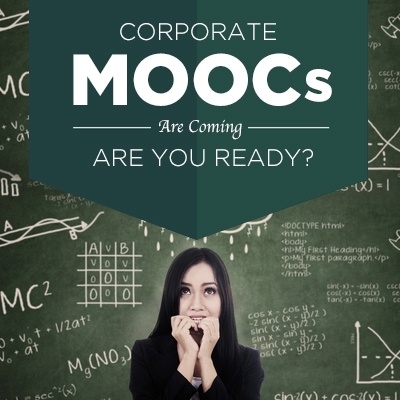As Fast Company notes, “The fact that lectures from the world's top professors are now a commodity available over the Internet for free is shaking up higher education from top to bottom, but the ultimate purpose is still hazy: Are MOOCs best viewed as a supplement for traditional college students, continuing education credits for adult learners, or a full degree program for learners in the developing world?
”The ability of MOOCs to provide educational access to all continues to generate significant interest. New York Times columnist Thomas Friedman described them as an educational “revolution”; The Washington Post praised them as a way to provide “elite education for the masses.” Many businesses see MOOCs as an opportunity to bridge the skills gap between workers and employers and to bolster corporate training efforts.
Corporate MOOCs and the e-Learning Industry
There’s been a lot of talk about the effect MOOCs will have on the e-Learning industry. “It will be transformational,” said Josh Bersin, chief executive officer of his eponymous consulting firm, in an interview with Bloomberg Businessweek. Pat Galagan, editor-at-large for the American Society for Training & Development, also believes in the power of MOOCs for training: “The possibilities seem tremendous, just thinking about it and what I know about the industry.”
One benefit of MOOCs for corporations is the way they bring learners together. Take for example this anecdote from a New York Times article on MOOCs: A professor at Athabasca University started a MOOC on what was happening in open education. The professor, George Siemens, said it was quickly apparent that the format created distinctive social networks, as students carried on wide-ranging discussions on their own.
“A lot of the relationships formed through that first course are still continuing today,” said Mr. Siemens, who is also a facilitator of Georgia Tech’s program. “What we found was that in a MOOC, instead of the classroom being the center, it becomes just one node of the network of social interactions.”
For companies looking to create more interaction between departments and employees, a greater social connection can be a good thing. And with a learning management system like CourseMill or Lectora Express – The Easy LMS, it’s simple to create a central knowledge-sharing hub focused around the content of your MOOC.
Furthermore, by blending corporate training and MOOCs, employees could receive certification for on-the-job training. A corporate-sponsored, MOOC-like learning program associated with a brand-name educational institution would provide employees with corporate training that carries weight outside of their organization. Walter Shill, global senior director for Accenture’s management consulting practice, believes that the day is coming when certification from MOOCs or MOOC-like training is listed—and respected—on résumés.
Companies often spend millions of dollars to build or buy all types of training in the core skills category. These courses—basic management, office productivity, math, Excel and other core business skills—cost companies $100 to $500 per employee, per year, according to Bersin’s 2013 Corporate Learning Factbook. Companies would save a great deal of money by accepting certificates from MOOCs. In addition, offering their own MOOC courses could be a recruiting tool for companies to attract the best candidates with the most potential. With a robust e-Learning authoring tool like Lectora Inspire, your organization can get started creating its own MOOC today. And then you can be at the forefront of this exciting trend!

